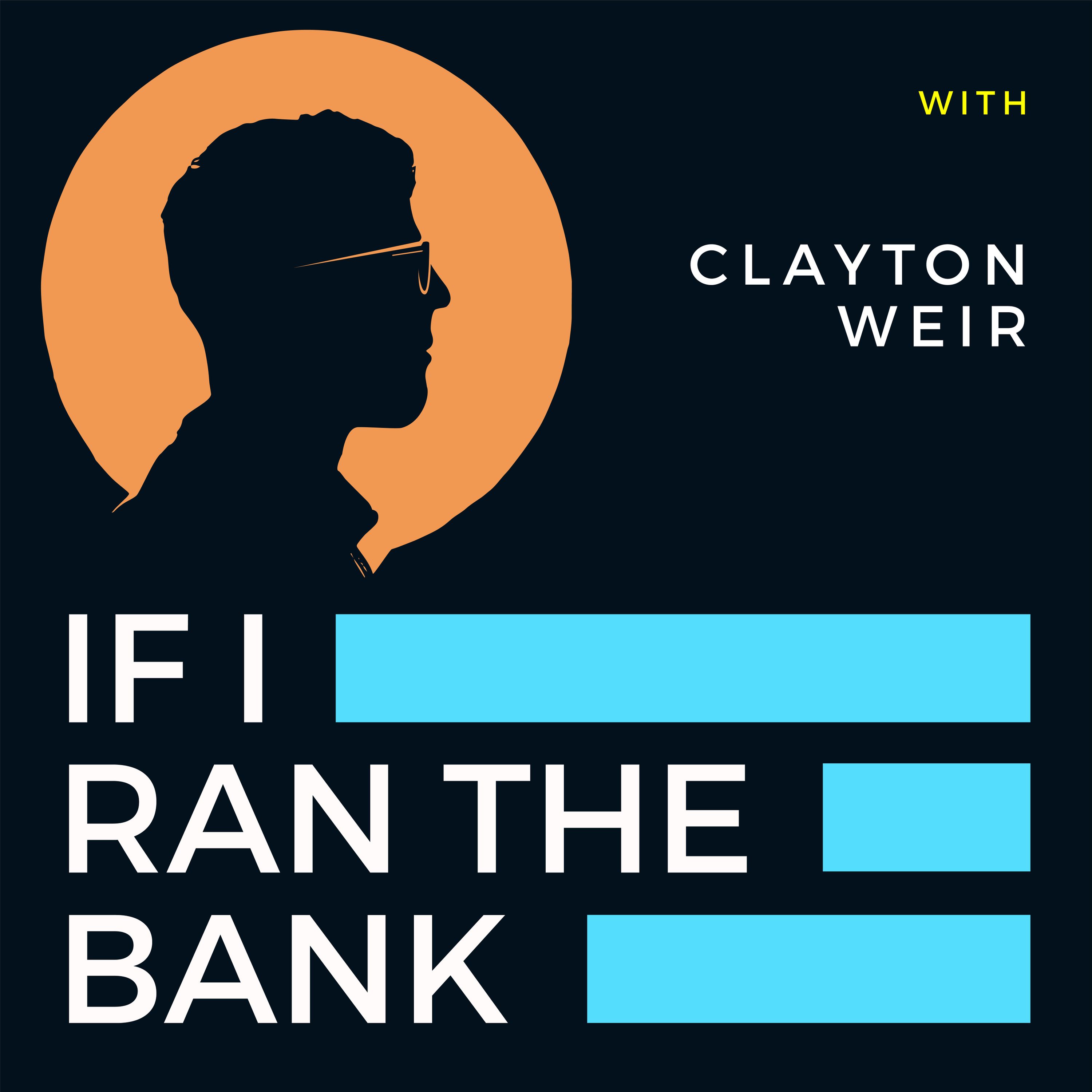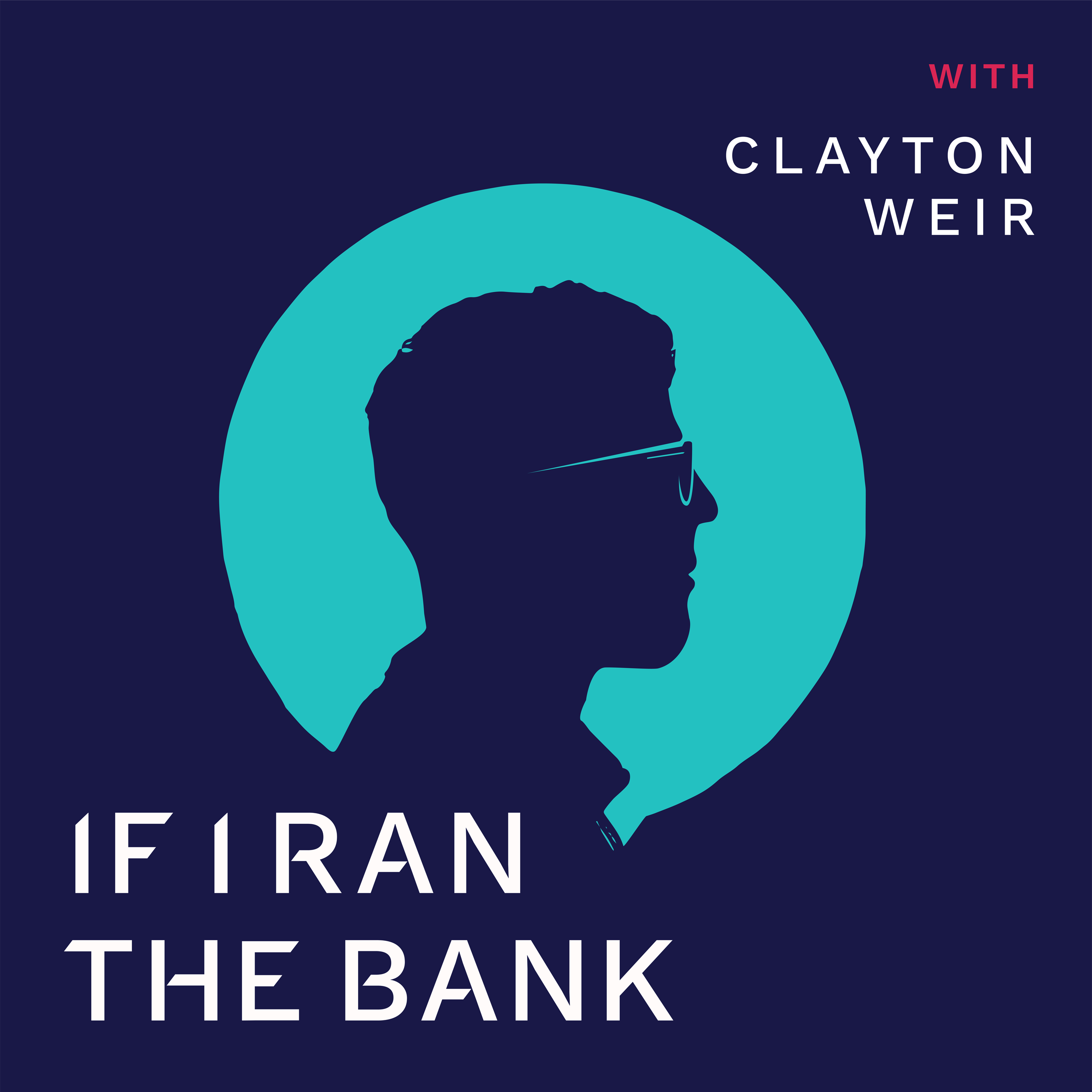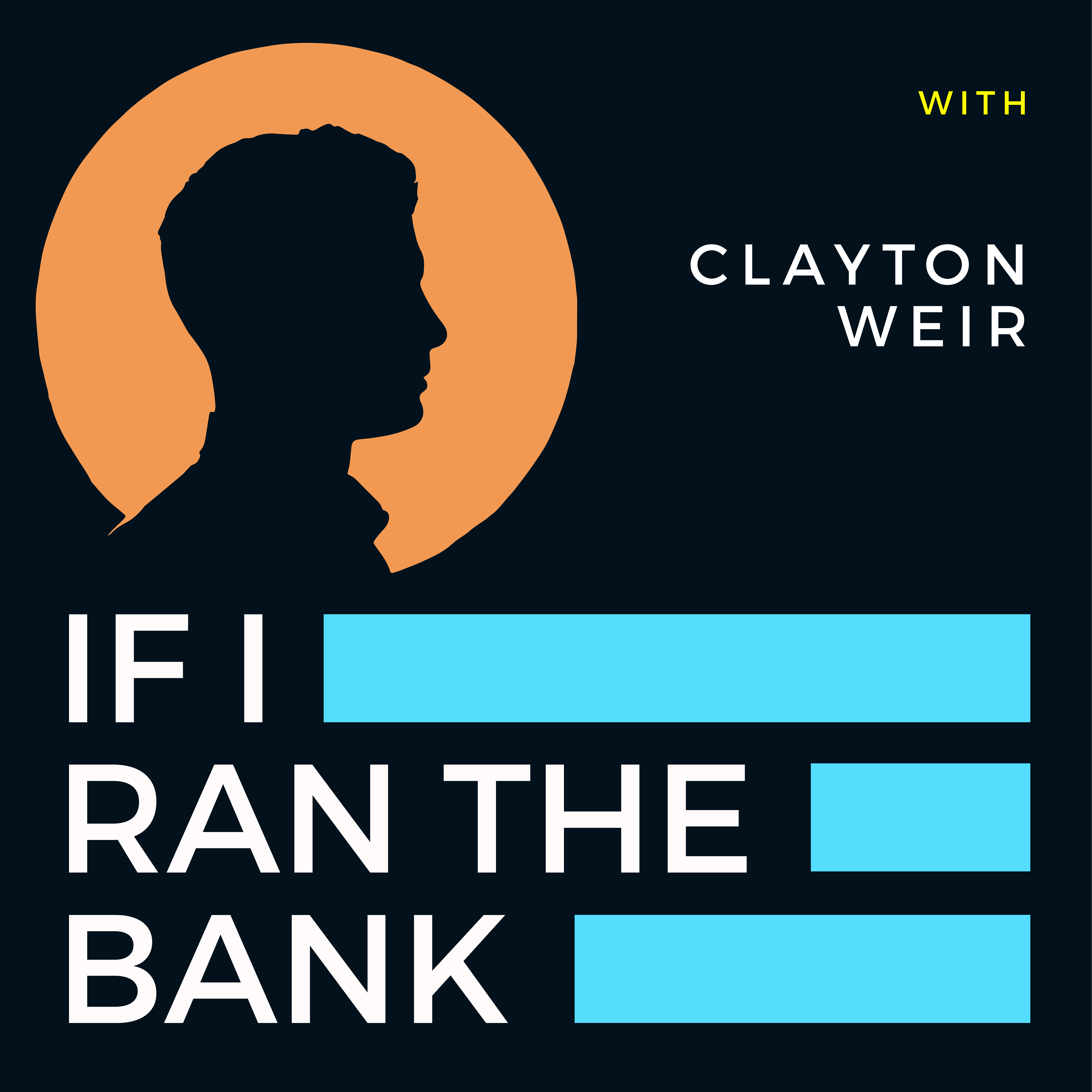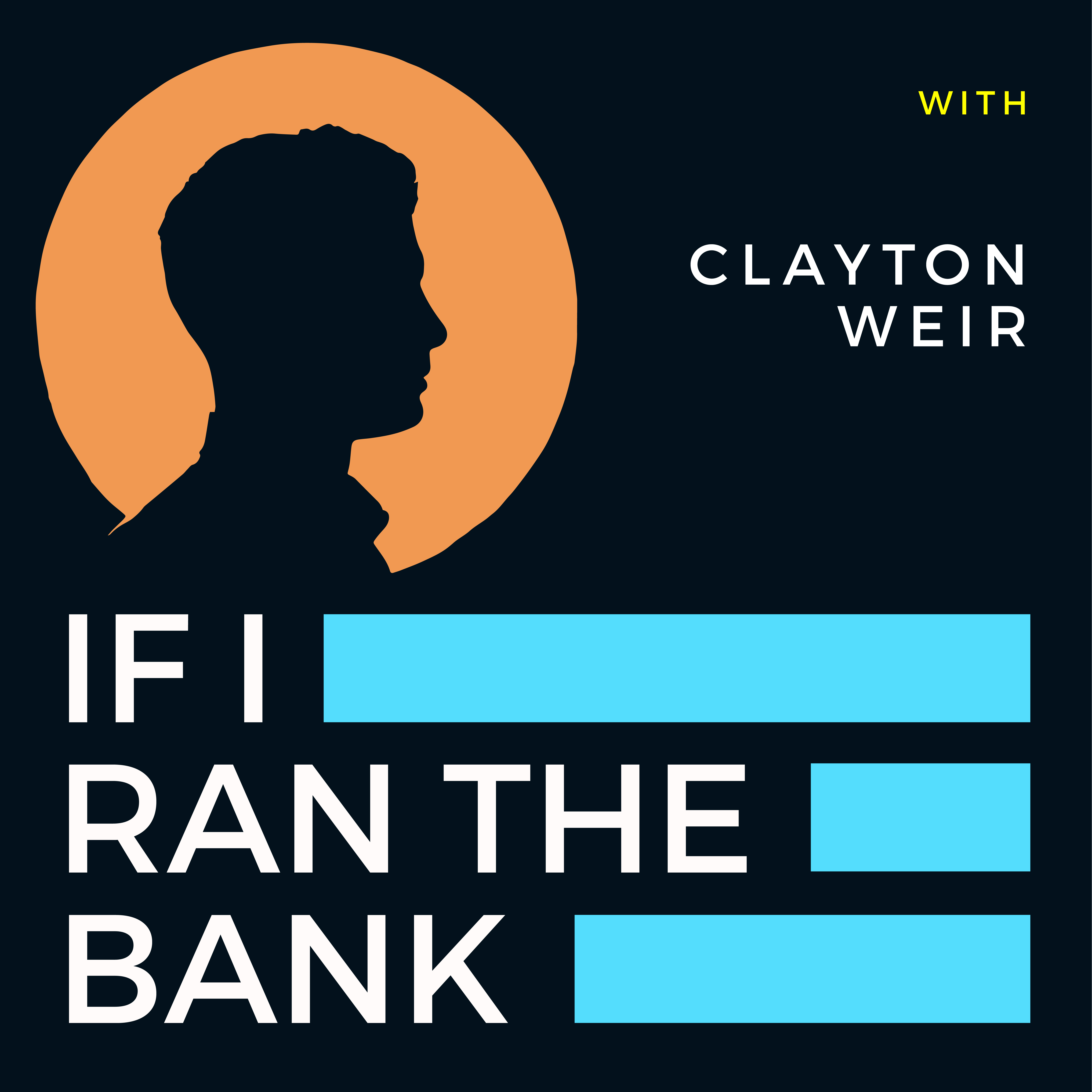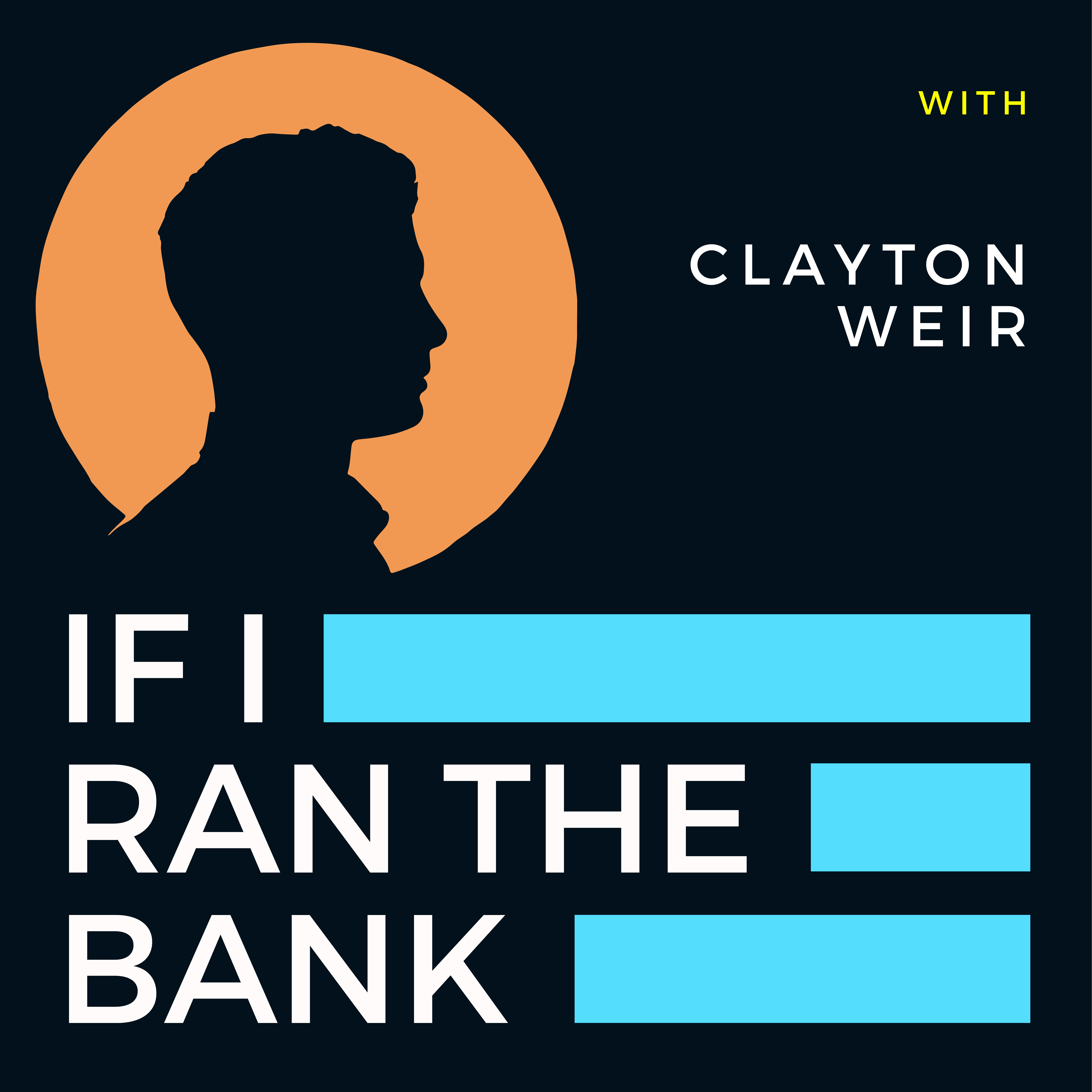Transforming the Bank Experience with Dharmesh Mistry
- 0.5
- 1
- 1.25
- 1.5
- 1.75
- 2
Announcer: If I Ran The Bank is a podcast hosted by Clayton Weir, co- founder and head of product and strategy at FISPAN, a Fintech that is enabling banks to provide contextualized consumer life experiences to their business clients. Clayton is a thought leader in financial innovation and hits on the hottest topics in banking, finance, and the future of payments. And he wants to know, if you ran the bank, what's the one thing you'd go all in on. Please tune into Spotify, Apple Podcasts, Google Play, or wherever you get your podcasts. And now here's your host Clayton Weir.
Clayton: Hey everyone. Welcome to another episode of If I Ran the Bank, I'm your host, Clayton Weir. I'm very excited for my guest, Dharmesh Mistry here. I do not know him and I'm going to warn you, this is the first time in my life I've ever taken any advice from our mutual friend, Neil Stellar. So, I hope it pays off, I'm almost certain it will. The reason I was excited about inviting Dharmesh on this show is he has been building sort of bank infrastructure and experiences since, I guess realistically, before the internet, and it's had a front row seat for the last 30 or so years of the major waves of digitization and innovation in financial services, I think, most prominent recent role as the Chief Digital Officer of Temenos, which is one of the largest core bank and core technology providers to banks around the world. And now I think, even more interestingly, is the CEO of an app called AskHomey, which is, in my opinion, a very interesting example of what you would think of as an evolution of the kind of embedded immersive FinTech experience that we've been talking lots about over the last few years. So, welcome Dharmesh. Do you want to fill in the blanks on anything there?
Dharmesh: No, no. I mean, look, it's a great pleasure to be on the show and I feel very privileged that Neil still talks highly of me, but I'm really looking forward to it. And I would say just one correction, because I am old, but I'm not as old as the internet. So, he meant that I've been involved with the internet since the modern internet. Let's put it that way.
Clayton: Yeah, not the ARPANET. And to be fair, the timeframe of which the internet existed in the context of banking, which is a much smaller subset of the history of the internet, I guess, was the point I was driving it. So, on that note, I think for some people, and I think this sort of is the bridge in some ways to your big idea, but I think in some ways, the business might not seem like the obvious next step after being part of the leadership of a large core banking vendor. Do you want to maybe explain a little bit more about the app, about the tool? Why did you start it, what it does?
Dharmesh: Sure. Let me give you a bit of a background about something that is highly relevant. So, I sold my previous startup, which put banks and insurance companies online without writing code. It was a zero coding environment, which I sold to Temenos in 2012. And that was really to accelerate their capabilities in mobile and internet banking. While I was there, really, my plan was I got my money for selling the company, I'm going to sit tight for a while, and then I'm going to craft up my new startup, and then leave. But actually, Temenos was a really nice place to work and there were some good people, despite me and Neil there, that I actually enjoyed what I did. And in the first year of putting out mobile and banking solutions, I grew that business from zero by hundreds of percent and that was deemed very successful. So, from there, I got the opportunity to define their digital strategy. And in the digital strategy, I basically looked at what they had and where I thought banking was going to go. And my perspective was that we had to split the core banking into a front and a back, and that in the future that we would see manufacturing the backend part consolidate, just like other industries have, that when you're making a product, the scale of it allows you to commoditize that product that smaller players can't compete; and that had that yet to happen in banking. We thought it happened with tier one banks, but it hasn't really happened fully.
Dharmesh: And my view was that all of that would happen by cloud, enabling that scalability and we'd see banking running as a service in the cloud. And that's not a new thing for me because I presented that as a strategy to NatWest probably 10 years before that. And they've declined the opportunity because they didn't want to undermine their own brand in banking. So, the concept was, I still believe that cloud would accelerate that movement towards cloud for core banking. On the flip side, what naturally happens in the market is that once you say that, you're not responsible for manufacturing the product, then the other parties tend to grow and they service niche customer segments. They take the product and then they service a specific segment that's not being serviced by other people in a generic fashion. So, for example, that we would see many more distributors of financial products. And I used to give the example back in 2013-2014, when I crafted this strategy, I had said, "Look, we'll get these experience driven banks and I can see that there will be a bank for landlords because I'm a landlord today and all that the bank gives me is an account." What I want the bank to do is to tell me when a rental payment has been missed or has come in late to tell me if some of the bills are getting larger than I expected to separate my expenses between capital and income and help me with my tax return. Those are the kinds of things I have to do as a landlord. If the bank helped me with that, I'd say, "Fantastic service." right? Now, I used to run a kid's football team and one of the things I have to do, which the other 30 managers of the other age groups also did, was to collect money from the parents, account for that, and produce newsletters, schedule the matches, etc. And if you think about the amount of money that's being involved, it may be small amounts per child. But as a club, we were dealing with lots of money.
Dharmesh: Now, imagine a bank that manages the experience of being a club manager, help me to get the newsletters out, collect the subs, tell me who's late, provide the accounts for the club at the end of the year. So, experienced driven banks take a segment, provide banking as part of the picture, but not all of the picture. All of the picture is managing that entire journey. That leads me to what I am doing now. So, one of the case studies is that what's the largest segment we could think of other than an individual human being? Well, it's homeowners. Homeowners today have to manage all of their paperwork and their data. Some of it lives on spreadsheets, some of it lives on bits of paper, some of us are semi organized, and we have it on Google Drive, but most of it, the vast majority of it are scattered in many places. We have to also manage our finances, which is not just the bank account and the mortgage, but it's also the bills and the subscriptions, it's the cost of repairs, it's the cost of replacements, or any other projects that we have to do. So, finance is more than just mortgaging the account.
Dharmesh: And then thirdly is getting things done. I want reminders of the things that I should get done around the house, I want to have the ability to share information about repairs that I might want to do without having to make three different phone calls and tell three sets of people the same thing to get competitive quotes. So, all of this kind of stuff is the headache of a homeowner. And really what the platform does is to look at that journey as a homeowner in entirety and tries to fulfill it through an ecosystem of providers. And that's really what AskHomey is; it's an experience driven bank for homeowners.
Clayton: Totally makes sense. This idea is near and dear to my heart. So, if I had to paraphrase it, what your worldview, not just your business, but I think more broadly of what banks or other entrepreneurs could be doing is you take the painful jobs that people need to do, whether they're small businesses who have a unique to that industry set of jobs, or whether there's some private individuals who because they're football coaches or homeowners or whatever, and you solve those practical life pain points. And for doing that in a smart way, you get the privilege of delivering the info or capturing the financial services component of those transactions. In your case, I think probably broader than that, you get to marketplace, a wide range of other services, and nobody cares that you're making money on that because you're just making all of these things that I need to get done in this very specific context way easier for me.
Dharmesh: Correct. Essentially, aggregating the things that you need to get done around the house. Now, those fees, et cetera, would have been charged anyway. By volume and size, we'll make fees smaller. So, we're actually saving you money by coming through one place rather than going to many different places.
Clayton: So, it's interesting in so many ways. One of the questions I have, I've always noticed in the UK, it seems we have a little bit of this here, but it certainly seems that there's a culture there where the grocery store will have a bank and the retailer will have a bank, and Bill has kind of gone in on this, there seems to be at least a little bit of a precedent of that kind of-- in telecom, it's like the mobile virtual network operators. So, it's like they would take the, in this case, the British Telecom network, slap a brand on it and offer it. And it's not exactly what you're talking about but it's the precedent to this idea, you're taking it to the nth degree. Do you think there's a better culture of this in the UK or Europe than there is in North America? Or do you think it's the same? I'm just kind of curious about that contrast.
Dharmesh: I think that it's harder to get something going in the UK, to be fair, especially when it comes to financing a new initiative, I think, because of Silicon Valley, you tend to get funded quicker and better in the US than you would in the UK. We have far more judicial on the funding side of things and it holds back innovation. And that's an interesting point. What we're doing is specifically what I think VCs look for, which is it's not about the innovation, it's about, are you addressing an unfulfilled customer need? Is there something that the customer is not getting done today that you're sorting out for them, that they will thank you for later on? And that's really where it starts. And I think my experience is that in the US, those kinds of things get addressed very quickly.
Clayton: It totally makes sense. And I think we have seen I think the provisional behavior that shows you the potential power of this in the US has probably been somewhat around because the infrastructure for prepaid/debit cards became so sophisticated and there was so many sort of program managers as a service that we've sort of seen that micro wave of innovation; where like the founder of Def Jam or one of these guys had his own prepaid debit card. He brought in a whole bunch of people based on his brand provision to have these prepaid and they didn't have a bank account. These were the unbanked people. That was their bank account. It was based on a kind of offering and a brand proposition that spoke to them. That kind of micro targeting, using that infrastructure, again, kind of a predecessor to what you're talking about, but it's an interesting example of that wave of innovation. And so, I think in this conversation, though, you're doing the very hard work in your day job to go out and understand those unmet needs and you craft a proposition doing these painful jobs and making it easier for the homeowner and then probably for the owner of multiple homes as a property; and you have your roadmap, I'm guessing, right? That's really hard. But going back to I guess, where you had spent some time on the factory side or the server side of this equation, what needs to happen there? What are we missing in terms of tools or ideas, or I'm guessing probably even tier one institutions that are putting a compelling sort of platform: a banking of a service tool in front of entrepreneurs like yourself? What are the opportunities of the challenges on the factory side?
Dharmesh: Yeah, great question. My first two startups were both kind of aimed at enterprise software. We saw both of those did well out of those, right? But the name of the game very much was about accumulating some IP that you would sell on. But I think today, yes, there is a need for it still today. But in a platform like AskHomey, really, it's not about IP at all. You actually want to produce the least code possible and bring in as much as possible, and that's exactly what we've done. We've got no offices, I've got designers in Bali, I've got content authors in Canada, I've got developers in Bangalore; my team lives in four different parts of the UK, etc. So, none of the geography matters. We don't need a physical premise and we're not building software. What we're doing is gluing software together. Everything that we've done is actually on the Amazon Stack. Now, Amazon, they've got a massive amount of capability, they're nowhere near as advanced in some areas as an IBM or Microsoft. But the support and the infrastructure that they provide as a one-stop shop gets you going very quickly. And one of the things I've seen is maturity in their platform at a pace that I haven't seen with the other vendors myself. But really, on the infrastructure side of things, we were able to do things much faster on real depth of capability and functionality without having to write lots of lines of code. For ourselves, we're not inventing a new chat platform to facilitate community chat within our solution. We're not inventing open banking ourselves because we can just take that off the shelf from somebody else. So, really, our role is as an orchestrator of these things and managing the roadmap and saying, "Ah, which of the components can we bring in to build a big piece of the jigsaw very quickly for us?" It's a different mentality to how I used to be when I worked for banks, where we built everything as much as we could do. And then if we really needed something that was infrastructure, we'd go to an IBM or Microsoft.
Clayton: Yeah. I think Uber is an obvious example, the amount of value creation they had in their business, there's lots of very hard problems they solve to build that business. But technologically, there's zero proprietary technology in the earliest. For the first decade of that business, it was the Google Maps API, the stripe credit card API, the Twilio texts, your car is your API. It was 10 different off the shelf components that just had to be plumbed together, and obviously, building a tremendous user experience and all that on top of it. But the hard parts of the technology stack were things somebody else that all solved.
Dharmesh: We went through a phase globally where banks were being told by consultants, "You need to be a technology company. Only the tech companies are going to survive in this game." That is rubbish as far as I can see. It's not about being a technology company. It's about understanding technology and how you can leverage it to solve customer problems in a smart way and implement it quickly. Leave the technology to the technologists that focused 100% of their time on that, because as a bank, we should be serving customers and identifying what their needs are, translating them into technology solutions that we should be picking off the shelf, and orchestrating into an overall experience.
Clayton: This is an interesting question. I'm actually going to disagree with the phrasing of your premise that a bank shouldn't be a technology, but almost what strikes me as what you're trying to say here, back to your initial point about there being a factory side and an experience side of this, is banks interpreted that advice in certain cases that we should be a technology company on the factory side. Whereas, I think what you're saying is, "Spend 100% of your proprietary technology investment on the experience side, get out of the factory." Like not most of us outside the mega super tier one banks probably shouldn't build a payment hub from scratch. Maybe nobody should, but ...
Dharmesh: Nobody should build a payment hub and nobody should build a core banking system. Nobody should build a chat platform. Like today, nobody builds an email platform or the database, and it starts to apply to banking capability now.
Clayton: I guess we're jumping back and forth, but did you see that from Temenos perspective? Like, do you think as the core vendors, are you getting better? Because one of the other arguments, I think, to taking control of your factory side kind of technology tools is the bank was the propensity for vendor lock in, where you get tied up in, for example, the FiOS ecosystem, and then all of a sudden, you were just living your life where you didn't have this componentization or this modularization of different services, you kind of got watered down to not mess in class across your whole thing and I think that's what spun the pendulum towards build our own technology. Is that changing? Do you think it's easier to now kind of grab something I like from FiOS and grab something I like from Temenos and kind of build my back office off the shelf but not be locked into one vendor?
Dharmesh: I mean, there's always going to be a certain amount of dependency on a vendor, right? But yes, things have got definitely easier, definitely easier because when stuff moves into a more cloud native architecture, we're not worrying about what hardware it sits on, what language it's written in. All of those kinds of technical issues that we had in the past have gone away. And moving to a cloud kind of based solution, I don't believe that-- I mean, for me, we're on a single cloud, but that's a choice. At some point, I'll start to say, "Well, actually for this component, I'm going to just buy this product and it sits on you." I don't care what platform it sits on, I just need to know what the interface is. So, technologies come to a point where, where we're dealing with just interfaces that are internet enabled, so we don't worry about the underlying infrastructures. It makes a lot easier to move now.
Clayton: Totally makes sense.
Dharmesh: The other thing that's starting to happen with things like open banking and coming downstream for Europe is open finance; not just account based products, but things like pensions, and mortgages, credit cards, investments, etc. The portability of data becomes much easier. That solves the other big problem about switching, which is, "Oh, one of my data lives here. I might be able to talk to something else, but then what about my data? Do I need to go through a big exercise to kind of transform it and understand how to map it in, etc.
Clayton: I think that's really interesting. And that was the point of the question I was going to ask you next was. When we do this podcast, you get talking heads on stage at the conference who would blab on about how the open banking infrastructure, especially the European one where there's read and write, and hypothetically, this Nirvana state we've always promised. The outcome is supposed to be that for somebody like you that's making-- I mean, I don't think your startup is a pure play like fintech or banking startup, but it's obviously to some extent, an embedded or an exponential sort of fintech product-- the open banking infrastructure, the argument should have been that it would make your life easier or make your product better, you could have a wider scope of services. Is that true? Do you guys use any of it today? Does it, in your opinion, fundamentally change what AskHomey does versus what it would do if you had to launch in the US today and didn't have that access?
Dharmesh: Yeah, absolutely. 100%, I'm a big fan of what's happening with open banking and have been. When I was doing the digital strategy with Temenos, the one thing that occurred was the White Paper came out about 2014 for open banking and when I read the paper, I said, "Wow, this is just so timely." because essentially, what it's doing, it's going to accelerate what I said in my paper around the manufacturing and distribution separating and then being a growth in distribution place. So, I absolutely believe that but I think it's taken not only time to get all the rails in place and the standards working, banks on board, etc. But it's taken cycles for banks to understand that open banking isn't a threat. It's actually a huge opportunity. Being there right at the beginning-- I remember presenting in Australia to a credit union kind of conference, it was the biggest one in Australia, and I talked about this open data. Yet, you might be able to do that in the UK or Europe, where you're much more open to this kind of stuff. But in Australia, the top four banks control everything. We won't even take Google Pay and Apple Pay, let alone do this open banking thing that you're talking about. And I said, "Well, look, it's not up to the banks. It's actually a governmental thing." Because if your government doesn't encourage open data and as a subset open banking, it's going to give advantages to foreign banks in your country at some point, because these guys will be innovating sooner, faster and your clients will want that. So, by the time you come to it, these foreign banks will be ready to enter your market. So, it's a government responsibility to push open banking in your country to protect you guys.
Clayton: It's a gift from the queen to declare this because it's you take your £200 million program for all of your APIs and your authentication engine and everything you need to do and you write it off to compliance in a world where it would be almost impossible to build the investment case for it otherwise. Thanks, Queen. Have a nice day.
Dharmesh: Yeah. Look, if we didn't have HTP and those underlying TCP/IP those protocols just as an open platform, then we wouldn't have the internet today. So, the next release of the internet is about this data really being able to be transported and a new level of innovation. We're just at the tip of the iceberg in terms of the innovation and some of that you're seeing already with some of the neobanks, but phase one was better banking by neobanks moving on to the cloud. So, leveraging a lower-cost base infrastructure and more modern technology. And that's, for me, like neobank 1.0. What we're seeing with experience driven banks is neobanks 2.0, where they say, "Well, look. We don't want to compete on a level basis with banks just on a cost base. Because as we see, when you start to scale your products and your reach, those costs will start piling in and your marginal difference will be eroded. So, you have to change the business model. And the business model in one opportunity is experience driven banks. It's doing more than banks are willing to do today.
Clayton: Do you see that there's an opportunity or what's the action item? I'm thinking of when you were at Temenos, your customer set in Canada, which tends to be these kinds of regional tier two credit union financial institutions. So, they obviously have like a geographic focus. So, if you're sitting in the bank boardroom, are there opportunities at the bank level to be developing these? And I mean, niche has maybe the wrong word, but these targeted experiential offerings-- like, should banks be doing that themselves or should they be enabling you to do it as a third party?
Dharmesh: Good question. I think for a large bank, it's going to be extremely difficult, because this isn't a level playing field as such, this isn't about like trying to fight one big bank against the other, because there'll be far too many experiences that a bank could cover. So, you've got to pick your bets as to which are the customer segments and the customer journeys you want to enable. And you may say, "Well, look, actually we want to stick to our knitting as a full stack bank, but we want to open up to enable these experiences for other people." So, if they want to do a customer journey that manages landlords, then fine, because we're not servicing them individually. But if a landlord that wants just to do their banking just for their home, as well as their landlord, as well as for their kids, et cetera, and don't want to have these separate land relationships, they can just come to us. So, I think multiple models will coexist. It's not just a rip and replace of banking, but it's more like an onion that will get more and more layers of different models of banking coming to the play.
Clayton: Totally agree. So, on that note, maybe just to try and tie a bow on this, what's the one sort of idea or action item you'd want to leave with the big stakeholders here listening? I'm thinking of it-- one, what's the one thing I take away from this if I'm a tier one banker? What's the one thing I take away from this if I'm the VC or the entrepreneur thinking about exponential banking as a category? And maybe for those people in the middle, whether it's the legacy incumbent technology providers or the people that are thinking about building the backing of service kind of platforms that we would still see in the future. Maybe for those three audiences, is there one sort of idea for each of those that you would want them to kind of go home and meditate on after listening to this podcast?
Dharmesh: It's difficult for all three I think. But I think it just goes back to the basics, which is really understanding and knowing your customer base, and knowing who's competing for that base. It's just the fundamentals of business. So, if I'm going to stay as I am, and I have my point of differentiation as a credit union is, we live on the shore and therefore, we service the local community. We don't see that changing. We don't see competition coming elsewhere from people that say, "Well, look. You don't have to live near us to bank with us. We provide all these other capabilities." If that's not a threat, then fine. But really, fundamentally, you've just got to know that you're solving an unfulfilled need and you address that unfulfilled need fully. You don't just take one part, which is the banking piece, but you go end to end. And I think that's good advice, not only for a bank, but also for a VC that's investing in potentially some of these fintechs that are coming out that are 'me too' but leveraging modern technology, but also, then from a software perspective. Because what used to be core banking as a full stack solution is now a tale of two halves and I certainly think that this is now where the new core is in the front office. Just like the old core used to be just about creating accounts and deposits, then we added capabilities like KYC and AML, checks, and then added credit risk assessment and added reporting, and bi and intelligence, and we ballooned out the core in terms of its capability. I think first thing is make sure that you've got a split between the front office and the back office; and in the front office, that is going to balloon and it will balloon far broader than what we have seen with core because this is where all of the innovation is occurring and new things like gamification and AI, and emotion detection, and stuff like that is all going to come in over time. And other edge technologies like 5g and IoT, et cetera, are also going to change the game. They're going to change it through the experience. So, I absolutely believe that the experience layer is the bit that's going to grow the most and I think that's a huge opportunity for software providers. What used to be one solution, now it's two. And maybe the digital part of that is the new core, right?
Clayton: No, I couldn't agree more. I think that's good advice. I mean, as you said, that's just first principles, right? Get as close to the customer as you can, anticipate their needs and work backwards the right amount that you need to from there to make it happen. I mean, I think we just sometimes get away from that in our day to day lives and it's it's important lens to always be seeing the world for when we're trying to create value.
Dharmesh: Certainly, never underestimate the simple changes that can absolutely transform an experience, like not having to go into your pocket to pull out your dollars to pay the cab driver. Just that simple change that the money's taken care of, what a difference it makes?
Clayton: Exactly. When you were thinking about IoT, I was trying to think of the killer use case for that in banking. I'm just thinking like in the future, your car could pay at the gas pump, right? Like, that's another one. I always find that it's always a pain in the butt when you fill a car up. Your car could be just communicating and say, "Yeah, that's like the right amount of gas. This is my RFID chip." it is what it is and it would be automatic, and then 30 seconds back in your day. A really pleasant experience.
Dharmesh: The other thing, come back to the AskHomey thing, another example on your IoT is that you ask any parent what's one of the things that annoys them about the kids. And it's the guy that pays the bill is the one that goes around, switching off lights, questioning unfinished drinks, and all that wasted expenditure. Why did we leave the heating on if we were out for the weekend? But this is where automation will come in and start to save money on behalf of the homeowner. And this is really one of the other elements of AskHomey is that it's an intelligent platform that starts to make these automations occur. So, inherently, it's running your house for you without you having to think about it. And that's really the way to think about where we're heading as a platform.
Clayton: No, totally makes sense. I think that's a great point to wind down on. Awesome. This has been a great conversation. I was excited for it, but I think it exceeded my expectations. Really appreciate the time, appreciate you sharing your thoughts with the audience.
Dharmesh: My pleasure. It's been a real honor to be on the show as well, so I can't wait to hear it back.
Clayton: Awesome. Well, thanks everyone for listening to this episode. As always, we encourage you to subscribe on Spotify, Apple, Google Podcasts, wherever you get them. Share the episode with a friend if you want and thanks as always to FISPAN for sponsoring us and send your complaints, concerns, or questions to hr@fispan.com if you have any. Thanks everybody.
Dharmesh: Thank you.
DESCRIPTION
Dharmesh Mistry is the CEO of AskHomey and carries with him a 30-year track record for delivering transformational innovation across the financial services industry. In this episode, Clayton and Dharmesh discuss how cloud technology is shifting the nature of core banking, the future of open banking, and understanding your customer base.
Today's Host

Clayton Weir
Today's Guests


